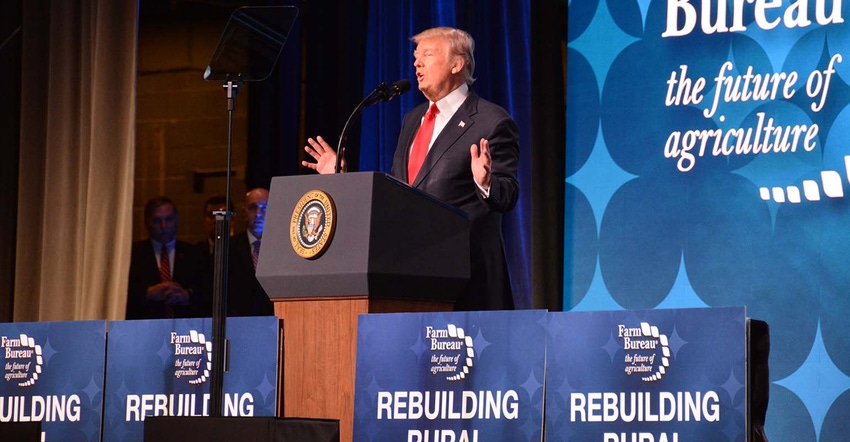
Donald Trump campaigned on a promise to roll back regulations. And after a year on the job, he’s pleased with his actions to back up his words.
While speaking to farmers at the American Farm Bureau Federation meeting in Nashville earlier this year, Trump highlighted his administration’s actions to cancel or delay over 1,500 “planned regulatory actions or assaults” across the government.
Trump promised to eliminate two regulations for every new one, but he claims he actually cut 22 regulations for each new one.
The rollback most popular with farmers was the Waters of the U.S. rule. EPA is undergoing a two-step process to repeal and replace WOTUS, which was proposed in 2015 under the Obama administration. At the end of January, the agency took steps to delay implementation of the rule for two years to complete its rewrite process.
Attorneys general, all Democrats, from 12 coastal states filed a lawsuit days later against the action.
As for USDA, Secretary of Agriculture Sonny Perdue says the agency has identified 27 final rules that would save $56 million annually if eliminated. He said the deregulatory actions generate measurable cost offsets in annualized savings and help ensure USDA’s programs are delivered efficiently, effectively, with integrity and with a focus on customer service.
Provisions of the school lunch meal requirements have also been peeled back.
Rules face lawsuits
Among the list of the most controversial regulations USDA has halted or slowed include the Grain Inspection, Packers and Stockyards Administration rule and an organic livestock rule. Both are facing lawsuits.
In October, GIPSA withdrew the Farmer Fair Practices Rule, which would have allowed farmers to hold agribusinesses accountable for practices such as retaliation, bad-faith cancellation of contracts, or collusion efforts to force farmers out of the market.
The rule was the result of a multi-year process, based on thousands of comments from the public, including independent farmers and ranchers, to help ensure fairness in food production. However, major livestock groups had concerns over the rule’s scope and the impact it could have on current marketing.
The Organization for Competitive Markets filed a lawsuit in the form of a petition review in the U.S. Court of Appeals for the 8th Circuit.
In December, USDA announced its intent to withdraw the Organic Livestock and Poultry Practices rule. It was finalized in January 2017 but placed on hold when the new administration took office.
OLPP, initially proposed in April 2016, expands and clarifies existing requirements covering livestock care and production practices.
It was supported by the Organic Trade Association, but many livestock groups opposed the rule.
The Agricultural Marketing Service received over 47,000 comments on USDA’s request on whether it should implement, suspend or withdraw the rule. More than 40,000 of the comments, including over 34,600 submitted as form letters, supported implementing the rule as it was proposed.
However, Perdue withdrew the rule. Over 70,000 comments in support of maintaining the proposed standards were filed during a brief 30-day comment period in response to USDA’s withdrawal announcement. OTA also has filed a lawsuit against USDA’s actions.
“President Trump has shown great leadership on reducing burdensome regulations,” Perdue said. “No longer can we afford onerous red tape that simply serves to hold American agricultural producers back from feeding and clothing the world.”
Perdue asks farmers and ranchers to bring any onerous regulations to USDA’s attention by visiting https://www.usda.gov/ruralprosperity.
“We’re just getting started,” Perdue says.
About the Author(s)
You May Also Like






